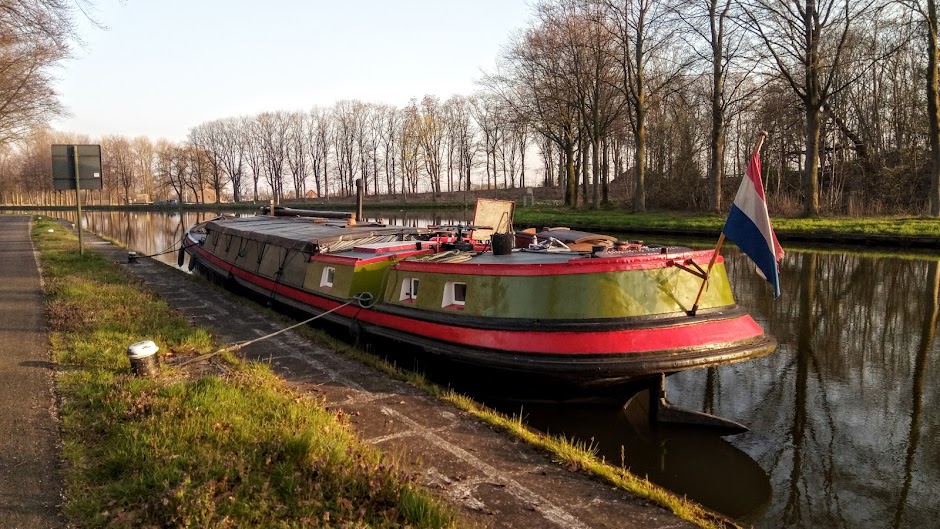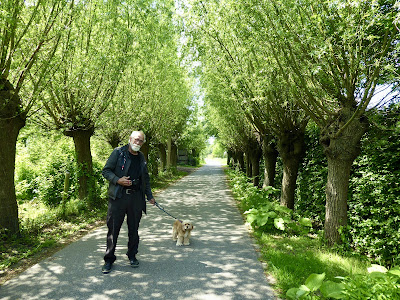"Time to cast off?" I asked. Koos nodded and within a couple of minutes we were on our way, heading upstream with the current easing our passage. Even the sun was doing its best to break through the overlying clouds and the light it cast on the moored boats we passed was stunning.
It took us three lovely hours to reach Dendermonde, the place we'd decided to spend the night. The Schelde is always captivating, combining wilderness and mudflats with the human side of river life: boats, ferries, pontoons and small marinas. I love it, especially as it had the untamed element I find so appealing in tidal reaches.
At Dendermonde, the sun came through with more conviction promising a lovely evening. We decided to bite the bullet and take a mooring at the marina, a fitting and comfortable end to the sixty kilometres we'd travelled that day. Having tied up, we looked for someone to report to and found a phone number, which Koos called. The harbour master was busy elsewhere but told us he'd come by shortly. When he turned up, he thanked us for our honesty in calling, something he acknowledged the Dutch were particularly good about; others, he said, were more likely to take a chance if he wasn't there. He was a friendly, chatty soul, but quite what he was doing as a harbour master, I don't know, because he he promptly proceeded to tell us all about the classic Porsche he was restoring. His enthusiasm for old cars was definitely greater than it was for old boats.

The following day, Easter Sunday, was glorious. Since we knew we couldn't leave until the afternoon (that tide again), we were blessed with a visit from one of my daughters and her partner. They came bearing breakfast, good cheer and towpath walks, but even after they left, we had to wait more than two hours for the change of the tide, a time spent doing gentle jobs in gentle sunshine.
In fact it was four o'clock before the current stilled and we were able to leave Dendermonde to complete the last thirty plus kilometres to Gent. The map below shows this stretch of the journey, which as you can see, was full of twists and turns; the Schelde is as natural a river as can be found anywhere.

It was a gorgeous if somewhat suspense-filled few hours. We'd made two assumptions: the first being that having the current with us, we'd go much faster than our usual 8 kms per hour; the second was that owing to the first, we'd be at the Merelbeke lock well before dark. We were wrong on both counts. The advantage we'd expected from going with the flow never happened. For some reason, we were ahead of the incoming tide all the way, so our speed was disappointing. As a result, we were increasingly aware of the sinking sun as the afternoon sped into early evening, and I couldn't help checking Google maps at frequent intervals to see how far we had to go. All the same, the river was so beautiful it was easy to relish the warmth and golden glow of the spring sun.






Our relief at reaching the Merelbeke lock a few minutes after eight o'clock was palpable. We'd arrived in time to avoid having to put on our emergency lights, and we were even more relieved when a passing cruiser told us we could enter the lock ready for an early passage the next morning. Not only that, but the skipper of the commercial barge already in the lock invited us to tie up to him, so we wouldn't have to adjust our ropes during the night to compensate for the rise and fall of the water. Such good fortune and such kindness made a perfect ending to the day. All we had to do was make sure our lights were ready for the six o'clock start in the morning and set our alarms for five thirty, a time of day I don't see very often.
 |
| The light fading in the Merelbeke lock |
It was still what I consider to be the middle of the night when the lock keeper did her rounds just after six, checking on our details and our permit number. We'd barely managed a cup of coffee before scrambling outside and turning on our green and red navigation lights – the first time we'd ever used them, and, for me, my first time navigating in the dark, albeit not for long.
The first signs of dawn were nowhere to be seen as we exited the lock. The darkness enveloped us and I stood up in the bow absorbing the new experience of faring at night. However, within fifteen minutes, everything changed and the grey light of day crept over us as we steered into the Schelde's city reaches to encounter the first of the day's disappointments.
To cut a long and slightly tortuous story short, we discovered quite quickly that we wouldn't be able to take our normal route through Gent: all the locks and bridges were closed for Easter Monday, a hold up we weren't expecting.
After some extensive and extended manoeuvring that highlighted Vereeniging's hopeless reverse gear rather painfully and tested poor Koos's patience severely, we managed to back out of the narrow cutting near the Brusselsepoort lock, turn around and head back to the ringvaart. You can see the detour we had to take in the map below. The blue line was as far as we got. Had we been able to continue straight on (more or less), we'd have joined the red line where it says Evergem. Instead, we had to take the red circuit line (the ringvaart) around the city, adding yet more kilometres to our journey.

The day became progressively grey, cold and blustery as we headed round the Gent's watery ring road to Evergem lock, and by the time we approached the home straight north to Zelzate, it had deteriorated still further with a strong wind blowing. I'd looked forward to this final stretch; after all, it was Vereeniging's first time along our great Gent-Terneuzen sea canal. But the weather gods had decided we'd had enough fine weather the day before so our arrival at the historic harbour, her new home in Sas van Gent, was dramatic for all the wrong reasons.
The wind gusts were so strong as we entered the harbour, we couldn't even reach our official mooring and after being blown across the water to an alarming degree, we had to 'park up' in another spot, sanctioned by the harbour master's deputy. It wasn't quite the arrival we'd hoped for, but we had at least arrived, 8 days and 370 kilometres after we'd left Oudenbosch. Despite the disappointments the day had brought, we felt more than a little triumphant to have accomplished it.
The photos below were taken the day after our arrival. Of course, the weather was beautiful again, but it was a few days before the wind had dropped sufficiently for us to move to our official mooring.
We did it, though, and here she is, in place, in her new home and ready for some new life and adventures.
All it remains for me to say is a huge thank you to Koos for steering us so stoically and skilfully through the Netherlands and Belgium on our week-long marathon. My steering contribution was limited by my wrist because Vereeniging's somewhat stiff horizontal wheel needs two hands, but at least I could still manage the ropes, check oily, greasy bits, make coffee, cook and generally provide first mate support. Koos, however, never flagged and dealt with the old girl's old-fashioned quirks like the experienced skipper he is. On my wishlist for the future? A better reverse gear and (in my dreams) a bow thruster. Maybe one day...




























































